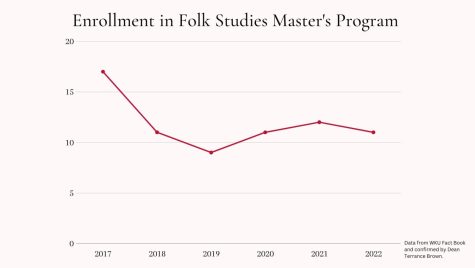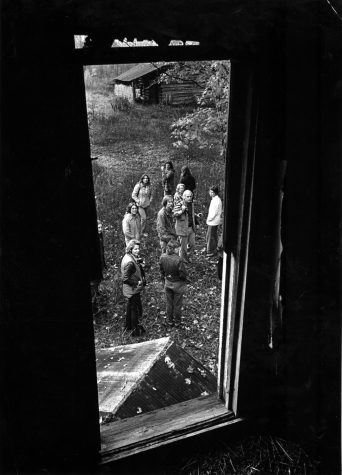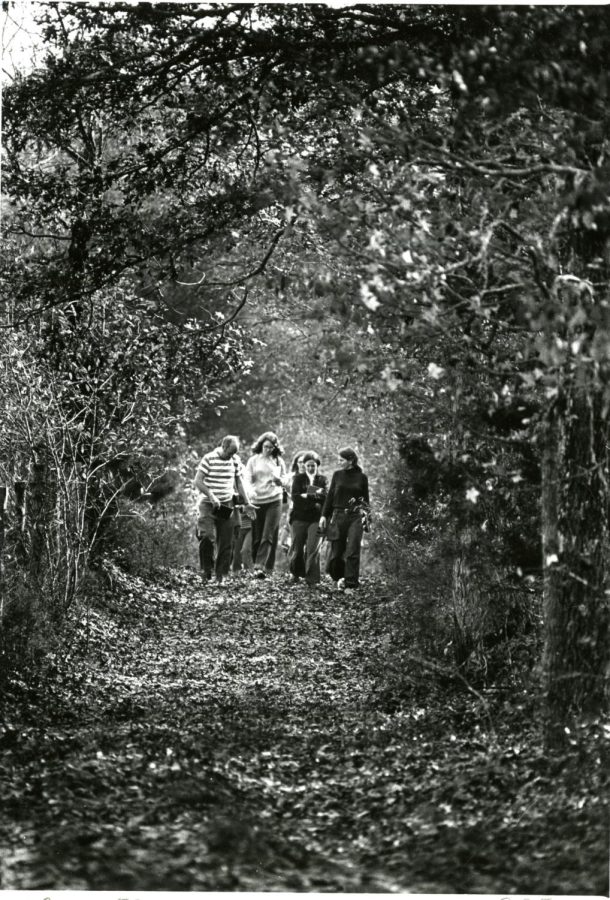‘Imminent death over surrender and execution in disgrace’: Students, alumni react to loss of folk studies graduate program
This story originally appeared in the Herald’s news magazine edition, published on Nov. 28.
Lynwood Montell leading class on field trip to the Ozarks in Arkansas.
One of WKU’s best known and unique graduate programs – which is in its 50th year – may face suspension.
Ann Ferrell, director of the Folk Studies graduate program, shared that faculty didn’t feel trying to recruit new students for a program with so little faculty was ethical, given the possibility of suspension.
“In addition to the fact that we have a graduate program, Colonnade courses and an undergraduate minor to support–it would not be ethical to recruit or accept students into a graduate program without the faculty necessary to support student needs,” Ferrell said via email. “We have concentrations in Public Folklore, Museums Studies, and Historic Preservation, as well as a Research Thesis option. In order to train students in careers in these areas, we must have faculty with training and experience in these areas. We will not have that next year, even with a one- year instructor.”
In 2015, the program had six tenure track faculty and one full time instruc- tor. Currently, the program only has three full-time professors – one of which plans to retire after this academic year.
“This decision was not made lightly and neither the faculty nor I wished the program to move to this conclusion,” Potter College of Arts and Letters Dean Terrance Brown said in an email sent to faculty on Oct. 24.
After the initial announcement, Jace Lux, WKU director of media relations shared an email from Brown that said he intended to fund an instructor level to serve the Kentucky Folk Life Program and the Department of Folk Studies and Anthropology in the 2024 academic year.

Brown also offered another tenure-track position beginning in the 2025 academic year if the program would grow its enrollment by four students.
“Regrettably, this offer was not amenable to the faculty, and they elected to suspend the program,” Brown said.
Students in the program were “unofficially communicated” about the suspension on Monday, Oct. 10, ac- cording to the email. Current students will be able to complete the program as originally intended. Brown’s email states that a plan regarding the future of the MA in Folk Studies, Kentucky Folklife Program and the Department of Folk Studies and Anthropology will be discussed and determined in the coming months.
All 11 students in the program will be able to complete the program through the university’s teach-out plan.
“As such, until our plan is approved by SACSCOC, I cannot provide any additional details at this time,” Brown wrote.
Regardless of the potential teach-out plan, most students were shocked by the announcement of the program.
Caitlyn Sheets is a current graduate student in the Folk Studies program. Sheets shared that there are six students who started the program this semester – including one from Bangladesh studying at WKU on a student visa.
“I’m actually one of the lucky ones because I’m in my last semester, some of them are way out,” Sheets said. “This affects me less than everybody else in the sense of, I know all of my courses are going to be covered and I have the professors here to cover them.”
Darlene Applegate, department head of anthropology, contacted every student for an emergency meeting, Sheets said.
“She had to break the bad news to us. That’s crazy,” Sheets said. “It was 10 in the morning and we get an email emergency meeting. Every class is can- celed. I’ve really come in like ‘oh no, who died’ like this is terrible. And it’s somebody who made a joke like, ‘are we going under, what’s up?’ And they were like, ‘yeah, well actually, this is it.”
When asked if a communication plan had been shared yet, Sheets said it has yet to be addressed.
“That has not been addressed,” Sheets said. “We need to sign up [for classes]. The other ones you have to sign up for classes to figure out whether they have to move again. Because this is like another abrupt change. They can’t just go home to their parents.”
Kaitlyn Bennett is a student and teaching assistant in the program. Bennett said she took the suspension especially hard, since she originally planned to be an English teacher before deciding on the folk studies program.
“I took it really, really hard. I won’t lie, like I was crying,” Bennett said. “When I heard the news, I just couldn’t believe it. Then I really hunkered down [and decided on the] folk studies program, this is what I want to do. So just to have [that] pulled out from underneath me, that was a shock.”
Fortunately, Bennett’s plan for graduation remains the same, but other students may not have the same fate.

“If there’s gonna be a last class, I might as well be part of it,” Bennett said. “It’s gonna be a lot different from how it may have gone in the past just because we’re not going to have the same number of professors. Some subjects might not be able to be taught as originally planned. So stuff might be independent study. We don’t really know yet.”
Despite the sadness associated with the future – or lack thereof – Bennett feels that this has brought people in the program closer together.
“It’s nice to see how resilient we’ve remained, like all of us students in our cohort, whether we’re first or second year [are much] closer,” Bennett said. “This has brought us together. It has obviously hurt all of us, but I think also the shared experience has brought us together, which is very relevant to our field.”
Bennett explained that while every student currently in the program will have the opportunity to complete the program, there are concerns about the flexibility for students needing a different class load.
“It’s going to be harder for them to complete it just because their original plan was a bit more spread out, so maybe they’ll have more difficulty in managing more classes than they originally intended to,” Bennett said. “[…] It’s definitely going to be a challenge for them.”
She also said the loss of the program is a shame due to the human nature of the field.
“We’re really just looking at the way that human beings interact with each other, tell stories to each other, pass on meaning through whether it be art or […] stories,” Bennett said. “It’s a very human field which, I think that’s the beauty of it.”
Tiffany Isselhardt, exhibit curator and development coordinator of the Kentucky Museum, shared that the museum consistently employs folk studies students.
“The Kentucky Museum has worked intimately with Folk Studies for many years, long before I came to WKU – hosting graduate assistants, interns, and classes,” Isselhardt said. “Many of our exhibitions and programs are the result of Folk Studies faculty and student efforts. Folk Studies has been a bridge to communities near and far, a centerpiece of applied learning at WKU. Personally, I feel that in suspending it, WKU has lost a hallmark program with a long track record of producing impactful programs, creating bridges between our campus and community, and fostering engaged and socially responsible citizens.”
Isselhardt wrote to President Caboni, Provost Bud Fischer and Dean Brown an email titled “Open Letter on Supporting the Arts.”
“Folk Studies has a long and diverse history in South-Central Kentucky, as many alumni and friends have shared,” Isselhardt wrote. “At the Kentucky Museum, Folk Studies graduate students are our primary student workers – as graduate assistants and interns. Many worked with us during the academic year and utilized their experiences with us to gain an advantage in securing lucrative summer internships elsewhere in the country. This hands-on experience is crucial for emerging museum professionals, helping them stand out in the American market where most museum studies degrees have traditionally prioritized theory over practice.”
In her letter, she shared that loss of this program breaks her heart.
Erika Brady, a retired Folk Studies pro- fessor, has lived and studied in Kentucky for over 20 years. During her time as a professor at WKU, she taught multiple undergraduate and graduate classes focusing on various topics in folklore, but she is focused in medicinal folklore.
Erika Brady is a leader and a vocal member of the Folk Studies community. Her work and her studies have influenced many current and former students in their career and life goals.
She believes that WKU’s Folk Studies program is an important part of the com- munity, not only in Bowling Green, but nationally and internationally.
Brady said the disbanding of the program “cuts off an extraordinary way that the program is linked with the community for 50 years. Not just the Bowling Green community, not just south central Kentucky, the Commonwealth and actual- ly the nation and internationally.”
The Folk Studies graduate program has had multiple international students, many of them taking this education back to their home countries, Brady said.

Paul McCoy is one such former student who works with museums and various arts programs in Tennessee. McCoy posted an open letter to the university administration on his Facebook page on Oct 27.
McCoy explained why the small size in his graduate program was beneficial. It allowed the students more hands-on opportunities.
“It provided us with greater responsibilities and opportunities for practical application of the skills we studied,” he said in his letter. “I worked in archaeology labs, taught classes, and engaged in spirited discussions with my classmates every week.”
He benefited from the members of the program, including Brady, being present in the community. This presence is what originally drew him to WKU, and why he chose to get his Masters in Folk Studies.
“I would see her [Brady] at festivals that we were playing and I would see her at concerts that were in the area and I would hear her on the radio,” he said. “I’m like, this person knows so much about the music of this area. Who is she?”
McCoy went on to co-host her radio show with her when he was a Folk Studies graduate student at WKU. Her presence in the community extended to those who never went to WKU, or attended college at all. The Folk Studies program drew in many people to the university who otherwise would not have known about it.
McCoy said the program being suspended felt like Western, “wasn’t dancing with who brought ‘em.”

Faculty chose “imminent death” rather than recruiting students for a program that was likely to face suspension.
“When the defenders of the Alamo faced the forces of General Santa Ana, they chose imminent death over surrender and execution in disgrace,” Brady said.
Co-Editor-in-Chief Debra Murray can be reached at debra. murray940@topper.wku.edu. Follow her on Twitter @debramurrayy.
News reporter B Turner can be reached at abigail.turner870@ topper.wku.edu.


